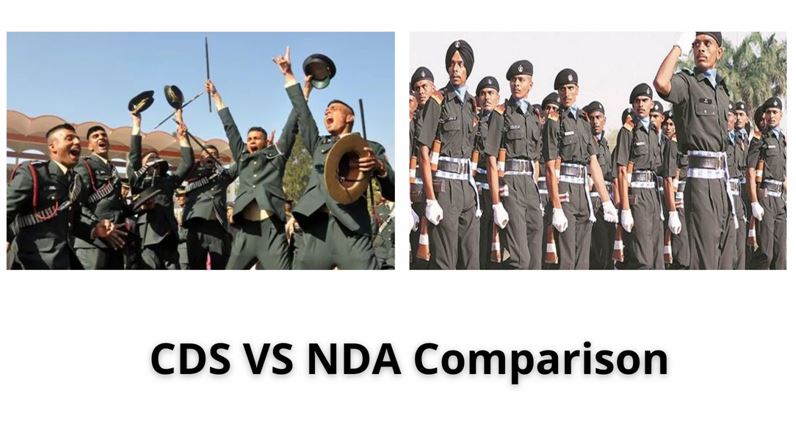Differences between NDA and CDS Exams: Which One Should You Choose?
For those with a deep desire to serve in the Indian Armed Forces, two prominent exams provide pathways to turn their aspirations into reality: the National Defence Academy (NDA) and Combined Defence Services (CDS) exams.
While both exams offer the opportunity to embark on a prestigious military career, they differ in various aspects, including eligibility criteria, entry points, the level of examination, and career prospects.
In this comprehensive blog post, we will delve into the nuanced differences between the NDA and CDS exams, providing detailed insights to help you make an informed decision on which path best suits your goals, aptitude, and circumstances.
1. Eligibility Criteria:
The eligibility criteria for the NDA and CDS exams significantly vary. The NDA exam is open to candidates who have completed their 10+2 education and fall within the age limit of 16.5 to 19.5 years.
Conversely, the CDS exam requires candidates to hold a bachelor's degree from a recognized university and be within the age limit of 19 to 25 years, depending on the specific academy.
2. Entry Points and Academies:
The NDA exam serves as a gateway to the Army, Navy, and Air Force through a joint training program at the esteemed National Defence Academy. Successful NDA candidates undergo a rigorous three-year training program before being commissioned as officers in their respective branches.
In contrast, the CDS exam offers entry to the Indian Military Academy (IMA), Air Force Academy (AFA), Naval Academy (NA), and Officers Training Academy (OTA), based on the candidate's preferences and qualifications.
3. Level of Examination:
The NDA and CDS exams differ in terms of the level of examination conducted. The NDA exam takes place twice a year and consists of a written examination comprising Mathematics and a General Ability Test (GAT) section, followed by an interview conducted by the Services Selection Board (SSB).
The CDS exam is also conducted biannually and comprises a written examination with three sections: English, General Knowledge, and Elementary Mathematics. Successful candidates from the written exam undergo the SSB interview process.
4. Scope of Examination:
The scope of examination in the NDA and CDS exams varies based on the educational background and knowledge required. The NDA exam primarily focuses on assessing the candidate's aptitude in Mathematics and general knowledge topics relevant to their 10+2 education.
On the other hand, the CDS exam encompasses a broader range of subjects, including English, General Knowledge, and Elementary Mathematics, requiring a deeper understanding of the chosen field of study.
5. Age and Marital Status:
Candidates applying for the NDA exam must be unmarried and fall within the specified age limit. In contrast, the CDS exam allows both married and unmarried candidates to apply, provided they meet the age criteria specified for each academy.
6. Commissioning and Training:
Successful candidates from the NDA exam receive training at the prestigious National Defence Academy for a period of three years. The training at NDA covers academics, physical fitness, and leadership development, molding candidates into well-rounded officers. Once the training is completed,
NDA cadets are commissioned as officers in their respective armed forces. In the CDS exam, candidates who qualify receive training at their designated academies such as IMA, AFA, NA, or OTA, based on their preferences and merit.
7. Career Advancement Opportunities:
Both the NDA and CDS exams provide excellent career advancement opportunities within the Indian Armed Forces. However, the scope and options for career progression may differ based on the chosen academy and branch. It is crucial to consider long-term career goals and aspirations when deciding which exam to pursue.
8. Specializations and Preferences:
The NDA exam offers the advantage of entering the armed forces directly after 10+2 education. This allows candidates to commence their journey early and gain exposure to various branches before making a specialization choice.
On the other hand, the CDS exam provides opportunities for graduates to join the military, allowing them to bring their academic expertise and specialized knowledge to their chosen field.
In conclusion, Choosing between the NDA and CDS exams necessitates careful consideration of individual circumstances, educational background, age, career goals, and personal preferences. The NDA exam provides a direct entry option for candidates right after 10+2 education, while the CDS exam offers opportunities for graduates to join the armed forces.
By understanding the differences between the two exams, you can make an informed decision and embark on a fulfilling and successful journey in the Indian Armed Forces, contributing to the defense and security of the nation.









2 Comments
Your blog has become my go-to resource. I always leave feeling enriched and inspired. Also read our Blog Post - NDA Written Exam
ReplyDeleteYou’ve done it again—another fantastic post! Your ability to dive deep into these topics while keeping things engaging is amazing!
ReplyDeletealso Read This Top 10 SSB Coaching in Delhi – GAPS SSB By Dipak Sir